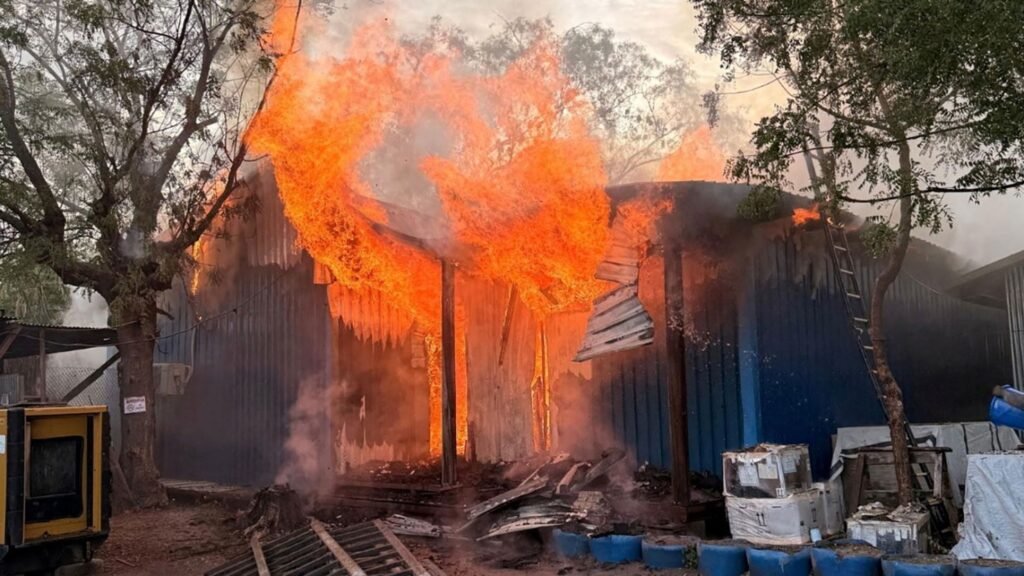JUBA, SOUTH SUDAN — A medical charity reports that at least seven individuals have perished following the bombing of a hospital and a market in South Sudan, exacerbating growing concerns about a resurgence of civil war in the nation.
Doctors Without Borders (MSF) stated that helicopter gunships dropped a bomb on the pharmacy of the hospital it operates in Old Fangak, located in Jonglei state. This attack resulted in the pharmacy being burned down, after which the town was reportedly shelled for a period of 30 minutes. Subsequently, MSF indicated that a drone bombed a local market.
According to MSF, the targeted hospital is the sole medical facility serving Fangak county, which has a population exceeding 110,000 people, and the bombing resulted in the destruction of all its medical supplies.
The charity denounced the attack, which also left 20 people injured, as a “clear violation of international humanitarian law.” MSF spokesman Mamman Mustapha informed the BBC’s Newshour programme that while the charity was still working to verify the details, local witnesses had identified the aircraft as belonging to “government forces helicopters.”
“The hospital is clearly marked as ‘hospital’ with our logo,” he emphasized. “We have shared also our coordinates for all the warring parties in the area so the hospital should be known to both parties as a hospital.”
As of now, there has been no immediate response from the government of South Sudan. The BBC has reached out to the foreign affairs ministry for comment.
Separately, on Sunday, a Sudanese army spokesperson reported that the paramilitary Rapid Support Forces (RSF) conducted a drone attack on an army airport in the city of Port Sudan.
This incident marks the first instance of RSF attacks reaching the Red Sea port city, which serves as the seat of the military government led by General Abdel Fattah al-Burhan.
Army spokesperson Nabil Abdullah stated that the RSF had launched several “suicide drones” targeting the coastal city’s airport, as well as “a goods warehouse and some civilian facilities.”
Abdullah reported no casualties but noted that the attack caused some “limited damage.”
In recent weeks, Nicholas Haysom, the head of the UN mission in South Sudan, has issued a stark warning that the country is “teetering on the brink of a return to full-scale civil war.”
These anxieties have been fueled by escalating tensions between President Salva Kiir and Vice-President Riek Machar.
Just hours before the hospital bombing, the head of the army, Paul Majok Nang, vowed punitive action following the hijacking of several barges on a river.
He attributed these attacks to a militia linked to Vice-President Machar, who has not yet commented on the accusation.
Machar was arrested in March along with several of his allies, facing accusations of attempting to incite a rebellion.
The government has recently designated certain counties as hostile, indicating their alignment with Machar.
This development has heightened suspicions that South Sudan may be on the verge of another conflict involving the country’s two major ethnic groups.
South Sudan achieved independence from Sudan in 2011, but two years later, a civil war erupted following President Kiir’s dismissal of Machar as vice-president, accusing him of plotting a coup.
The ensuing conflict, largely fought along ethnic lines between the supporters of the two leaders, resulted in an estimated 400,000 deaths and the displacement of 2.5 million people – more than a fifth of the nation’s population.
A peace agreement was reached in 2018, leading to the formation of a unity government with the same two individuals in leadership positions. However, elections that were supposed to have been held since then have not materialized.
The peace deal also aimed to dismantle all militias and establish a unified national army, but this has not been achieved, with numerous armed groups remaining loyal to different political figures.
The current crisis was ignited earlier this year when the White Army militia, which was allied with Machar during the civil war, clashed with the army in Upper Nile state and seized a military base in Nasir.
Furthermore, in March, a UN helicopter attempting to evacuate troops came under fire, resulting in several fatalities, including a high-ranking army general.
Rights groups have been urging the military to cease the bombing of civilian areas.

